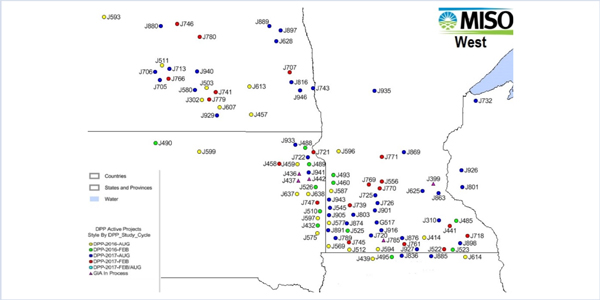By Amanda Durish Cook
EDF Renewable Energy will get a shot at taking its gripes about MISO’s interconnection process to a wider group of the RTO’s stakeholders.
In a unanimous vote Wednesday, MISO’s Steering Committee agreed to forward the company’s grievance about the length of the interconnection queue for further discussion in the RTO’s Planning Advisory Committee.
Still, some committee members expressed concern over similarities between EDF’s request to examine interconnection timelines and its recent FERC complaint about the structure of the queue. (See Renewables Developer Escalates MISO Queue Design Dispute.)
EDF, which asked the Steering Committee for an issue assignment in November, is still advocating for a two-stage interconnection queue process, rather than the current three stages. The company on Wednesday again asked committee members to consider how MISO could increase the pace of interconnections after RTO planners won approval for a new, streamlined design last year.
MISO Director of Stakeholder Affairs Shawna Lake said the RTO still believes it’s “premature” to make changes to the recently FERC-approved design before completion of a full cycle of queue studies.
“There are very, very long delays happening now, and we’re thinking there’s a way to tighten this up,” Bruce Grabow, an attorney representing the company, said during the committee’s Jan. 24 conference call. For starters, MISO could require secured site control for new generation, instead of a deposit, he said. The queue currently contains 355 projects representing 60 GW, the largest number of prospective projects in a decade.
EDF provided similar background earlier this month in its FERC complaint, which asked the commission to order a “workable” interconnection timeline to ensure that wind developers can secure federal production tax credits (PTCs) before they expire at the end of 2020.
But during Wednesday’s call, Grabow said EDF’s FERC complaint is entirely different from its committee request because the complaint focuses narrowly on speeding up studies only for wind developers and others impacted by PTC deadlines. Grabow predicted that even if FERC found fault with the queue process, queue entrants not relying on PTCs would continue within the current three-stage queue.
“There’s no way FERC would issue something that would impact the three-stage queue,” said Grabow, eliciting some skepticism from the committee.
Steering Committee Chair Tia Elliott suggested that EDF craft a fuller explanation of how the two arguments differ and where overlap might occur.
Two weeks after EDF lodged its complaint, RTO staff introduced a new feedback form designed specifically to capture stakeholder opinions on issues discussed during Interconnection Process Task Force meetings, in addition to other advice related to the queue. (See MISO Seeks Stakeholder Input as Queue Timeline Lengthens.)
MISO’s most recent predictions for the August 2017 cycle of projects in the queue indicate that most are expected to wrap up in February or March 2019, except in the Upper Peninsula area of MISO East, where projects are slated to finish this December. But in the wind-heavy MISO West region, projects are expected to clear the definitive planning phase (DPP) of the queue as late as July 3, 2019.
The RTO’s queue reform was intended to reduce the number of days that interconnection customers spend in the DPP from an average of 589 days to 460. Customers that entered the August 2017 cycle are currently predicted to spend an average of 579 days in the DPP before signing an interconnection agreement.






